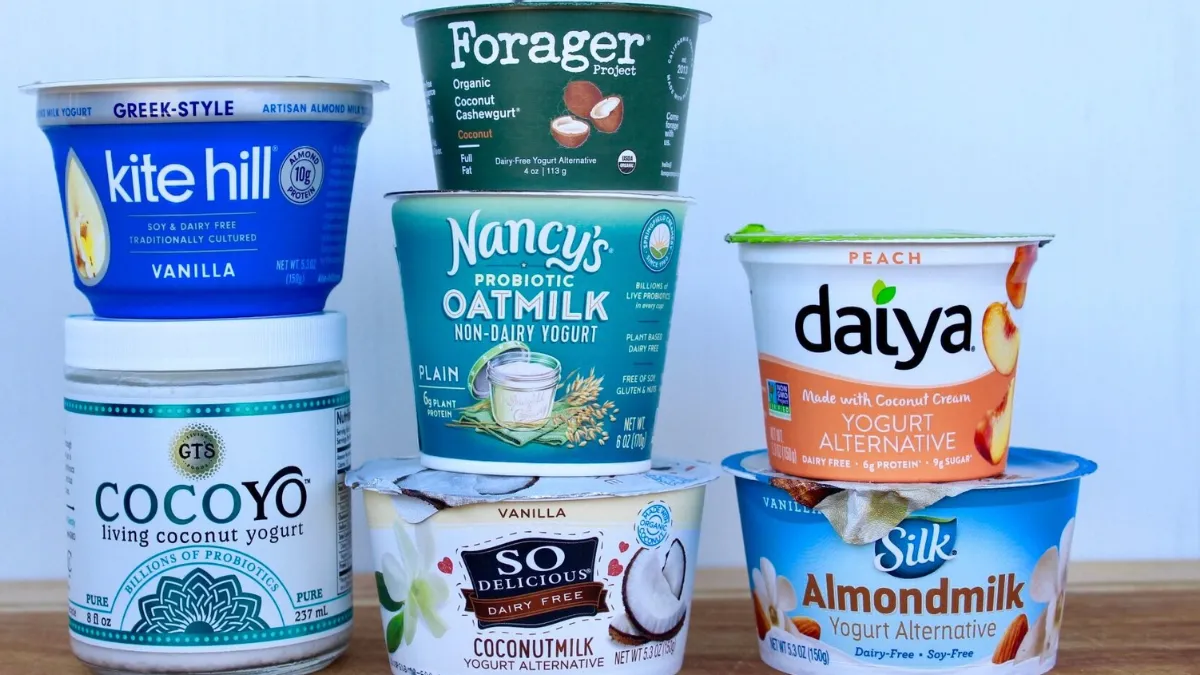1. Chobani, LLC
Chobani revolutionized the yogurt market in the U.S. with its authentic strained Greek yogurt. Founded in 2005, Chobani quickly grew to dominate the Greek yogurt segment by offering high-protein, low-sugar products made with non-GMO ingredients. Known for its innovation, Chobani has expanded into plant-based yogurts, oat milks, and probiotic drinks. It remains a market leader thanks to widespread distribution, bold marketing, and a commitment to quality.
2. Danone North America (Oikos, Dannon, Activia)
A subsidiary of French multinational Danone, this company owns several iconic yogurt brands in the U.S. including Oikos, Dannon, and Activia. Danone dominates a significant share of the American yogurt market, especially in traditional and probiotic categories. With both dairy and dairy-free options, Danone’s broad product portfolio caters to virtually every consumer preference.
3. General Mills (Yoplait)
General Mills markets Yoplait, one of the oldest and most recognized yogurt brands in the U.S. Though Yoplait’s popularity has waned somewhat with the rise of Greek yogurt, it’s still a household name, especially for families and kids. Its broad range of flavors and convenient packaging help it maintain a loyal customer base.
4. FAGE USA Dairy Industry, Inc.
FAGE (pronounced “fa-yeh”) is a Greek company that helped introduce authentic Greek yogurt to the American market. Known for its rich texture and high protein content, FAGE’s yogurts are made with just a few simple ingredients. Their “Total” line offers a variety of milkfat levels, and they’ve become a favorite among those seeking pure, minimally processed options.
5. Stonyfield Farm, Inc.
Founded in New Hampshire, Stonyfield Organic is one of the leading organic yogurt producers in the country. Now owned by Lactalis Group, Stonyfield focuses on sustainable agriculture, organic ingredients, and family-friendly yogurt products. They offer Greek, traditional, and plant-based yogurt options.
6. Siggi’s Dairy
Siggi’s is technically an Icelandic-style skyr brand, but its thick texture and high protein make it a direct competitor in the Greek yogurt space. Founded in New York and now owned by Lactalis, Siggi’s has a strong U.S. presence. The brand is known for its low sugar, high protein formula and clean, simple ingredient lists.
7. Noosa Yoghurt, LLC
A Colorado-based company, Noosa blends Australian-style yogurt with bold flavors and honey-sweetened richness. Its yogurt is thicker than traditional varieties but creamier and less tart than Greek options. Now part of Sovos Brands, Noosa is widely loved for indulgent flavors like strawberry rhubarb and lemon.
8. Maple Hill Creamery
This organic, grass-fed dairy company has gained attention for its commitment to sustainability and animal welfare. Maple Hill’s Greek and traditional yogurts are made with 100% grass-fed milk and contain no added sugars or artificial ingredients. The brand appeals to health-conscious consumers and is expanding rapidly through major retail chains.
9. Wallaby Organic
Owned by Danone North America, Wallaby offers Australian-style yogurt known for its ultra-creamy texture and less tangy taste. Made with organic ingredients, Wallaby stands out in the premium yogurt space. It offers both Greek and non-Greek varieties, appealing to a niche but growing audience.
10. Lifeway Foods
Known for its kefir—a fermented yogurt drink—Lifeway has carved a unique space in the U.S. yogurt market. While not a traditional yogurt company, Lifeway offers drinkable dairy and probiotic products that promote gut health. Its kefir is high in protein and probiotics, making it popular among wellness enthusiasts.
11. Brown Cow
Brown Cow is a smaller, niche yogurt brand focused on whole milk, cream-top yogurts with a naturally rich taste. Now under the umbrella of Stonyfield, Brown Cow appeals to consumers looking for less processed, indulgent yogurt options made from non-GMO and organic ingredients.
12. Trader Joe’s (Private Label Yogurt)
Though not a manufacturer, Trader Joe’s offers a popular line of private-label yogurts that includes Greek, Icelandic, and European-style options. Trader Joe’s yogurt is praised for its affordability, ingredient quality, and unique seasonal flavors. It plays a major role in U.S. yogurt retail sales due to the chain’s cult-like customer loyalty.
13. Kroger Co. (Simple Truth, Private Selection Yogurt)
One of the largest grocery chains in the U.S., Kroger produces a variety of private-label yogurts under its Simple Truth and Private Selection brands. These include organic, Greek, and low-fat varieties. Kroger’s in-house yogurt brands perform strongly in retail due to affordability and variety.
FAQs
1. What is the most popular yogurt brand in the U.S.?
Chobani remains one of the most popular and best-selling yogurt brands in the U.S. thanks to its wide availability, consistent quality, and expansive product line. The brand helped spark the Greek yogurt boom and continues to innovate with plant-based and low-sugar options.
2. What’s the difference between Greek yogurt and regular yogurt?
Greek yogurt is strained to remove whey, resulting in a thicker texture and higher protein content. Regular yogurt is usually thinner and contains more sugar and lactose. Greek yogurt is often preferred for its satiety and probiotic benefits.
3. Are store-brand yogurts as healthy as name brands?
Yes, many store-brand yogurts like Trader Joe’s or Kroger’s Simple Truth offer competitive nutrition profiles and clean ingredients. However, it’s essential to read labels—look for minimal added sugars and live active cultures.
4. Which yogurt brands offer the cleanest ingredients?
Brands like FAGE, Maple Hill Creamery, Siggi’s, and Stonyfield Organic are known for their minimal ingredients, no added sugars, and organic or grass-fed milk. These options are ideal for those seeking high-quality, natural products.
Conclusion
The U.S. yogurt industry is rich with variety, from legacy brands like Yoplait and Dannon to innovative, health-focused leaders like Chobani and Siggi’s. Whether you’re looking for organic, grass-fed, protein-rich, or indulgently creamy options, there’s a yogurt company that fits your lifestyle and taste preferences. With growing consumer demand for clean ingredients and gut-health benefits, these 13 companies continue to shape the future of the yogurt aisle. As always, reading the label and understanding what works best for your diet can help you make the healthiest—and tastiest—choice.

